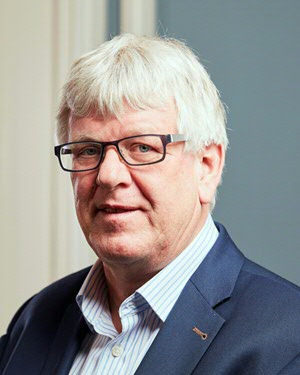Jouke van Dijk awarded Royal Decoration during farewell lecture

On Thursday 15 September 2022, Prof. Jouke van Dijk was awarded a Royal Decoration on the recommendation of the University of Groningen. This took place during his farewell lecture as Professor of Regional Labour Market Analysis and head of the department of Economic Geography at the Faculty of Spatial Sciences. City Mayor K. Schuiling presented him with the insignia. Van Dijk was appointed Officer in the Order of Orange Nassau.
Jouke van Dijk (Holwerd, 1956) is a leading academic of international repute who has put the field of Regional Science on the map. Stemming from his involvement in the Northern Netherlands region, he is committed to helping regions outside the economic heart of the Netherlands to further develop themselves.
‘Second-level’ cities
Van Dijk has focused on societal topics that are closely related, such as regional economic development, employment opportunities, production and labour productivity, innovation and technology, and contraction and ageing. In his research into migration and labour markets, he focused among other topics on the consequences of the departure of graduating students from cities such as Groningen and Leeuwarden. He saw this development as a ‘clean export product’, as these students are ambassadors of the North and often return later on, bringing valuable contacts with them. He also demonstrated that the growth of economic productivity mainly occurs in ‘second-level’ cities, such as Groningen, which are located outside the economic heart of the country.
International role
His idea of reasoning from regions outside economic centres has been embraced by the academic community. In 2020, Van Dijk received the prestigious title of Fellow of the Regional Science Association International (RSAI). From 2014 to 2018, he was President of the European section of this organization. Under his leadership as editor-in-chief, the scientific journal published by the RSAI grew into a leading journal in the field of regional economic development. Thanks to his contributions to the RSAI, the University of Groningen has built an excellent international reputation and, in 2016, was labelled as the third-best centre for regional science in the world.
Disadvantage of the North
As a born-and-bred northerner, Van Dijk is committed to the wellbeing of citizens in the Northern Netherlands in particular, including in the Wadden area. He has contributed to the public debate on the skewed distribution of prosperity in the Netherlands and the manner in which regions are harmed by the current labour market policy. For instance, in 2022 he produced numerical evidence supporting the feeling in the Northern Netherlands that the region holds a second-place status as a consequence of ‘Randstad thinking’. His calculations showed that the 1996 Langman Agreement did not enable the North to catch up with the growing number of jobs. As the chair of the Socio-Economic Council of the Northern Netherlands, he has contributed to the establishment of a knowledge and development agenda. In 2012, the Royal Netherlands Academy of Arts and Sciences (KNAW) appointed Van Dijk as chair and director of the Wadden Academy, and he led the development of sustainable knowledge management of the Wadden area.
Effective, critical, and ethical
Van Dijk is known for his abilities to connect academic issues with strategic applications and to translate complex academic knowledge into everyday practice. Through the clear way in which he explains labour market issues and other societal themes, he makes a valuable contribution to the discussion. He is often featured in national and regional media and is a much-requested speaker for conferences, symposia, and gatherings. He is critical about the economic policy of the Northern Netherlands. For instance, he questions the deployment of hydrogen as a new pillar of the Northern Netherlands economy. His opinions are taken seriously, among other reasons because he is able to maintain his academic independence and expertly substantiates his advice. Because of this, he is able to effectively convince policymakers without compromising his academic integrity.
| Last modified: | 15 September 2022 11.00 a.m. |
More news
-
11 March 2025
East Groningen: universal basic services must be up to standard
Sjierdan Koster makes the case for long-term thinking and for bringing Groningen’s universal basic services up to standard.
-
05 March 2025
Women in Science
The UG celebrates International Women’s Day with a special photo series: Women in Science.
-
11 February 2025
Space for your disability
When it comes to collaborations between researchers from different faculties, the UG is at the top of its game. A prime example is the Disabled City project that researches how the mobility of people with a physical disability can be explored...
